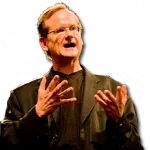
Open Video Conference
The Open Video Conference will take place June 19-20 at NYU Law School.
About Open Video:
Open Video is a broad based movement of video creators, technologists, academics, filmmakers, entrepreneurs, activists, remixers, and many others. When most folks think of “open,” they think of open source and open codecs. They’re right—but there’s more to Open Video than open codecs. Open Video is the growing movement for transparency, interoperability, and further decentralization in online video. These qualities provide more fertile ground for independent producers, bottom-up innovation, and greater protection for free speech online.
YouTube and other online video applications are rightly celebrated for empowering end-users; however, online video lacks some of the essential qualities that make text and images on the web such powerful tools for free speech and technical innovation. Email, blogs, and other staples of the open web rely on ubiquitous and interoperable technologies that have low barriers to entry; they are massively decentralized and resistant to censorship or regulation. Video, meanwhile, relies on centralized distribution and proprietary technologies which can threaten cultural discourse and innovation.
Open Video is about the legal and social norms surrounding online video. It’s the ability to attach the license of your choice to videos you publish. It’s about media consolidation, aggregation, and decentralization. It’s about fair use. In short, it’s about a lot of things, and that’s why this conference is going to be so exciting!
The conference is a production of Participatory Culture Foundation, Yale Internet Society Project, Kaltura, iCommons, and the Open Video Alliance. (The Berkman Center, Creative Commons, Big Think, and, hopefully, others are serving as partner organizations.) More information and registration is available at the conference website.
= = =
Open Video Conference
June 19-20, 2009
New York City
40 Washington Square South (NYU Law School)
The Open Video Conference
The conference is a co-production of the Yale Law School Information Society Project, the Participatory Culture Foundation, Kaltura, and iCommons. The conference will feature talks from internet luminaries, panels and discussions, screenings of video art, and demonstrations of the newest internet video technology. We expect more than 400 participants. Here are some goals for the gathering:
1. Bring together stakeholders in the online video space (video makers, coders, lawyers, academics, entrepreneurs, etc.) for cross-pollination and development of the Open Video movement.
2. Raise public interest and awareness around the Principles for an Open Video Ecosystem, a community effort to define best practices in online video.
3. Raise the public profile of video creators and artists working in the online space.
What Types of Proposals are You Seeking?
We are requesting proposals and ideas for panels, presentations, workshops, and other sessions that will address how we can shape online video and the public debates around the medium. Proposals may be intended for the main conference track, or for more focused unconference-style sessions. Proposal topics may be legal, technical, or cultural in focus, though we encourage proposals in all relevant areas. The more complete and fleshed out a proposal, the more likely it will be accepted—but we welcome the submission of all good ideas.
We are also seeking submissions of video art to showcase the creative potential of artists in the open video space.
To submit a proposal or idea for Open Video, please visit http://openvideoalliance.org/proposals/. The deadline for submissions is March 19, 2009. If you have any questions about the Alliance, the conference, or the submission process, please contact Ben Moskowitz at [email protected] .
Why is Open Video Important?
YouTube and other online video applications are rightly celebrated for empowering end-users; however, online video lacks some of the essential qualities that make text and images on the web such powerful tools for free speech and technical innovation. Email, blogs, and other staples of the open web rely on ubiquitous and interoperable technologies that have low barriers to entry; they are massively decentralized and resistant to censorship or regulation. Video, meanwhile, relies on centralized distribution and proprietary technologies which can threaten cultural discourse and innovation.
Open Video is the growing movement for transparency, interoperability, and participation in online video. These qualities provide more fertile ground for bottom-up innovation and greater protection for free speech online. Many organizations are already taking steps to change the nature of video on the web: Mozilla is moving to support open video formats in Firefox, the Participatory Culture Foundation promotes open source and standards in video publishing and distribution, and Wikipedia has increased its focus on the open Theora codec.
About the Open Video Alliance
The Open Video Alliance is a coalition of leading organizations dedicated to fostering the growth of open infrastructure, tools, and standards for the online video medium. Yale Law School's Information Society Project hosted a stakeholder meeting on October 31st, 2008; representatives from nearly 30 organizations convened to discuss common goals for technologists, maker communities, and legal experts.
For more information, see http://openvideoalliance.org.

